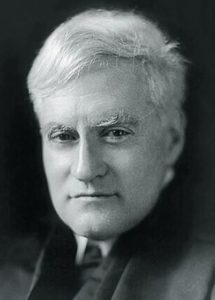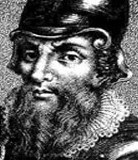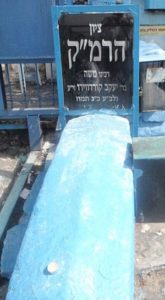Sephardic Supreme Court Justice
 Benjamin Nathan Cardozo (1870-1938) was born in New York City to a traditional Sephardic Jewish family that immigrated to America before the Revolution. The family grew wealthy and influential over the decades, and Cardozo’s father was a New York Supreme Court judge while his uncle (who he was named after) had been vice president of the New York Stock Exchange. His cousin was (former Jew of the Week) Emma Lazarus. Cardozo went into law like his father, studying at Columbia and passing the bar in 1891. After more than two decades of practicing law, the widely beloved Cardozo got elected to the New York Supreme Court. He continued as judge in various positions and on different courts until being appointed to the US Supreme Court in 1932. The New York Times wrote of this that “seldom, if ever, in the history of the Court has an appointment been so universally commended.” It was one of the few cases in American history that a Democrat judge was appointed by a Republican president. (President Hoover originally did not want Cardozo since there was “already a Jew” on the court, Louis Brandeis.) Cardozo went on to be hugely influential in the development of American law. His collected lectures given at Yale University are still standard reading for judges today. He was also a cofounder of the American Law Institute, to “promote the clarification and simplification of the law and its better adaptation to social needs, to secure the better administration of justice, and to encourage and carry on scholarly and scientific legal work.” Totally absorbed in his work, Cardozo never married or had children. He is regarded as one of the greatest Supreme Court justices in American history. Yeshiva University’s Cardozo School of Law is named after him.
Benjamin Nathan Cardozo (1870-1938) was born in New York City to a traditional Sephardic Jewish family that immigrated to America before the Revolution. The family grew wealthy and influential over the decades, and Cardozo’s father was a New York Supreme Court judge while his uncle (who he was named after) had been vice president of the New York Stock Exchange. His cousin was (former Jew of the Week) Emma Lazarus. Cardozo went into law like his father, studying at Columbia and passing the bar in 1891. After more than two decades of practicing law, the widely beloved Cardozo got elected to the New York Supreme Court. He continued as judge in various positions and on different courts until being appointed to the US Supreme Court in 1932. The New York Times wrote of this that “seldom, if ever, in the history of the Court has an appointment been so universally commended.” It was one of the few cases in American history that a Democrat judge was appointed by a Republican president. (President Hoover originally did not want Cardozo since there was “already a Jew” on the court, Louis Brandeis.) Cardozo went on to be hugely influential in the development of American law. His collected lectures given at Yale University are still standard reading for judges today. He was also a cofounder of the American Law Institute, to “promote the clarification and simplification of the law and its better adaptation to social needs, to secure the better administration of justice, and to encourage and carry on scholarly and scientific legal work.” Totally absorbed in his work, Cardozo never married or had children. He is regarded as one of the greatest Supreme Court justices in American history. Yeshiva University’s Cardozo School of Law is named after him.
Words of the Week
… any talk of driving the Jews into the Mediterranean, as we have heard over the last few weeks or the last several years, is not only unrealistic talk, but it is suicidal talk for the whole world and I think also it is terribly immoral. We must see what Israel has done for the world. It is a marvelous demonstration of what people together in unity and with determination, rugged determination, can do in transforming almost a desert into an oasis.
– Martin Luther King, Jr.

 Fernão de Loronha (c. 1470-1540) was born in Lisbon, Portugal to a Sephardic Jewish family that had been forcibly converted to Christianity by the Inquisition. Like many such families, they continued to practice Judaism in secret. Loronha became a wealthy merchant, and also worked for the German Augsburg banking family. He was knighted by King Manuel I of Portugal (and for this reason, was often associated with the Noronha nobility, being incorrectly referred to as “Fernando de Noronha”.) In 1501, he financed a Portuguese expedition to explore the newly-discovered lands of South America, then called Vera Cruz. Scholars believe his primary motivation was finding a new home for persecuted Jews, where they could finally live free of the Inquisition. Some say Loronha captained the expedition himself, and we know for sure that on board was Amerigo Vespucci (after whom “America” is named). At the time, Europeans imported expensive red dyes made from brazilwood from India. Loronha came back to Portugal in 1502 describing the abundant brazilwood in the new lands and the opportunity for great riches. King Manuel gave him an exclusive ten-year charter for all the commercial rights to brazilwood in Vera Cruz. In exchange, Loronha had to send at least six ships per year on behalf of Portugal, build a fort for the Portuguese military, explore new coasts, and pay the crown 4000 ducats per year. His first six-ship fleet set forth the following year, establishing the first brazilwood factories in the New World. Soon, vast amounts of the precious dye were being imported to Europe, making it the continent’s second most valuable commodity (after gold). The fleet also discovered a new group of islands, which Vespucci named São Lourenço, or São João. Shortly after, a grateful King Manuel gave the islands as a gift to Loronha and his descendants, and made him the first official donatario (“administrator”) in South America. Today, the idyllic islands are still referred to as “Fernando de Noronha” in his honour. Unlike many other colonists, Loronha did not employ slaves, and obtained all the brazilwood through trade with local natives. Most interestingly, it was Loronha who was responsible for renaming the new land to “Brazil” instead of its original name, Vera Cruz. Still a Jew at heart (and soul), Loronha did not want to use the Christian term Vera Cruz (meaning “True Cross”), so he would always refer to it in all of his business dealings as “Brazil” instead. The new name stuck. Similarly, he renamed his main ship from São Cristóvão (“Saint Christopher”) to A Judia (“The Jewess”). In 1506, his crew on that ship discovered a set of islands in Mozambique, named Bassas da Judia. Today, the name has been corrupted to “Bassas da India”.
Fernão de Loronha (c. 1470-1540) was born in Lisbon, Portugal to a Sephardic Jewish family that had been forcibly converted to Christianity by the Inquisition. Like many such families, they continued to practice Judaism in secret. Loronha became a wealthy merchant, and also worked for the German Augsburg banking family. He was knighted by King Manuel I of Portugal (and for this reason, was often associated with the Noronha nobility, being incorrectly referred to as “Fernando de Noronha”.) In 1501, he financed a Portuguese expedition to explore the newly-discovered lands of South America, then called Vera Cruz. Scholars believe his primary motivation was finding a new home for persecuted Jews, where they could finally live free of the Inquisition. Some say Loronha captained the expedition himself, and we know for sure that on board was Amerigo Vespucci (after whom “America” is named). At the time, Europeans imported expensive red dyes made from brazilwood from India. Loronha came back to Portugal in 1502 describing the abundant brazilwood in the new lands and the opportunity for great riches. King Manuel gave him an exclusive ten-year charter for all the commercial rights to brazilwood in Vera Cruz. In exchange, Loronha had to send at least six ships per year on behalf of Portugal, build a fort for the Portuguese military, explore new coasts, and pay the crown 4000 ducats per year. His first six-ship fleet set forth the following year, establishing the first brazilwood factories in the New World. Soon, vast amounts of the precious dye were being imported to Europe, making it the continent’s second most valuable commodity (after gold). The fleet also discovered a new group of islands, which Vespucci named São Lourenço, or São João. Shortly after, a grateful King Manuel gave the islands as a gift to Loronha and his descendants, and made him the first official donatario (“administrator”) in South America. Today, the idyllic islands are still referred to as “Fernando de Noronha” in his honour. Unlike many other colonists, Loronha did not employ slaves, and obtained all the brazilwood through trade with local natives. Most interestingly, it was Loronha who was responsible for renaming the new land to “Brazil” instead of its original name, Vera Cruz. Still a Jew at heart (and soul), Loronha did not want to use the Christian term Vera Cruz (meaning “True Cross”), so he would always refer to it in all of his business dealings as “Brazil” instead. The new name stuck. Similarly, he renamed his main ship from São Cristóvão (“Saint Christopher”) to A Judia (“The Jewess”). In 1506, his crew on that ship discovered a set of islands in Mozambique, named Bassas da Judia. Today, the name has been corrupted to “Bassas da India”.
